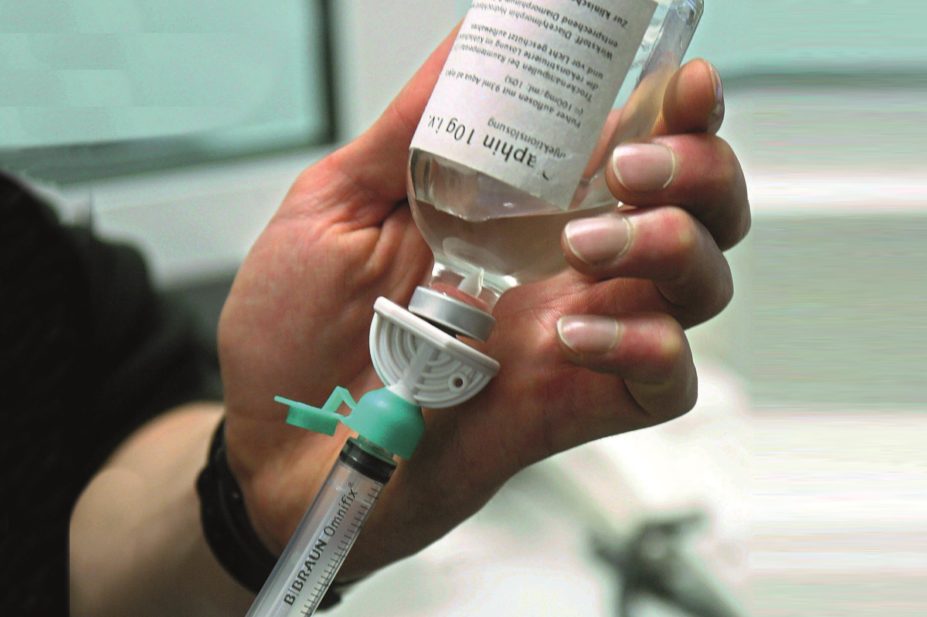
dpa picture alliance / Alamy Stock Photo
Analgesic dihydromorphone is as effective as diacetylmorphine (medical grade heroin) in preventing opioid addicts from using heroin bought on the street, reveals a new study.
Researchers in Vancouver, Canada, found that patients could not distinguish between dihydromorphone and diacetylmorphine, and that both drugs were equally effective at preventing addicts from using street heroin.
For people with the most severe opioid addictions, diacetylmorphine can be provided under supervision in some countries, including Canada and the UK. The aim of this treatment is to limit the use of street heroin, illegal activity and the transmission of infectious diseases. However, in some countries there is medical and political resistance to using medical grade heroin as a treatment for opioid addicts and the researchers wanted to find viable alternatives.
Reporting their findings in JAMA Psychiatry
[1]
(online, 6 April 2016), the team randomised 202 long-term users of injected street opioids to receive either hydromorphone or diacetylmorphine. The participants received the injections up to three times daily and were under supervision for a six-month period.
Overall, hydromorphone was deemed “non inferior” to diacetylmorphine. However, in the intention-to-treat population, the hydromorphone group reported using street heroin for 2.24 days more in the previous month than the diacetylmorphine group, which did not meet non-inferiority. For patients who adhered to the protocol, the difference was only 1.44 days and urine analysis testing found a lower proportion tested positive for street heroin metabolites in the hydromorphone group than the diacetylmorphine group. The researchers say this indicates that the two drugs were equally as effective.
In the UK and Canada, first-line treatment for opioid addicts is usually methadone maintenance or the use of buprenorphine, which is often combined with naloxone to prevent it being injected; this treatment is called Suboxone.
“While methadone and Suboxone are effective for many people with opioid addictions, there is a proportion of people who have not found success with these treatments. [The study] shows there are alternative treatments that may be able to help those who don’t respond to methadone and Suboxone. This is very exciting research and could go a long way in helping those who need it,” said Terry Lake, Canadian health minister.
In the UK, injectable medical heroin can be prescribed to patients who have failed treatment with methadone and buprenorphine. The London-based Randomised Injectable Opiate Treatment Trial reported in 2015 that this strategy lead to larger reductions in street heroin use than supervised injectable or oral methadone.
Hydromorphone injection is not available in UK, but in some countries, such as the United States, there is resistance to prescribing medical grade heroin to addicts. Diacetylmorphine is not even available to prescribe for pain relief in the United States.
The researchers say their results show there are effective alternatives that can be used in countries where diacetylmorphine isn’t available.
Although not widely used in the UK, in countries such as Denmark, The Netherlands, Germany and Switzerland, medically prescribed diacetylmorphine accounts for about 5% to 8% of substitution treatments and is showing “success”, say the authors.
References
[1] Oviedo-Joekes E, Guh D, Brissette S et al. Hydromorphone compared with diacetylmorphine for long-term opioid dependence. A randomized clinical trial. JAMA Psychiatry 2016. doi: 10.1001/jamapsychiatry.2016.0109
You may also be interested in

Voice of the Voiceless: co-produced materials to help reduce stigma for people receiving opioid substitution treatment in pharmacies

PJ view: The government’s approach to illegal street drugs should focus on treatment and prevention
